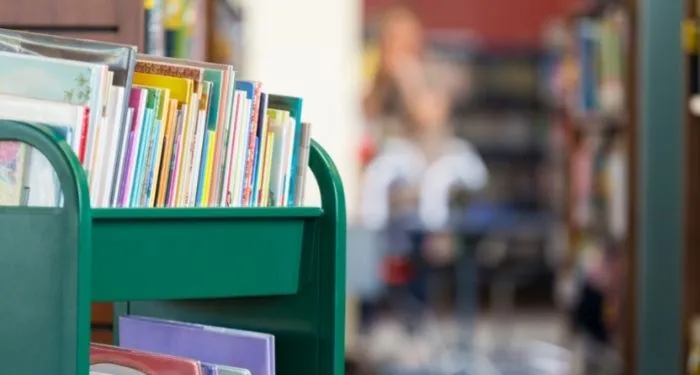
Growing as a School Librarian in a Post School Shutdown World
This past year was my first full year back in the library after COVID-related school shutdowns. Adjustments to remote learning meant that I spent the 2020-2021 school year back in the first grade classroom, something I was familiar with but not thrilled about. When the Media Specialist position opened back up, everyone assumed I would be thrilled. I assumed it would be a no brainer to accept the switch back to the job I had missed so badly. Surprisingly, I felt hesitant and nervous when it was announced officially that I was going to be the school librarian. All through the summer and even the beginning of the school year, I felt deep anxiety. This was what I had wanted! What was my problem?
The problem was lingering trauma that does not go away when ignored. This is such a large aspect of post-shutdown life, especially in schools. Those of us lucky enough to return to the physical buildings with our health can’t escape the fact that one day in March 2020, we left school thinking we’d take a quick break and things have literally never been the same. Even though eventually I was back “where I belonged” with the job I loved, I didn’t trust it. What if something else changed and I was moved? What if another unexpected event swept us away again? If I, a relatively well-adjusted adult, felt such uncertainty, imagine how elementary schoolers must have been feeling? It was a tough school year.
COVID is not gone, and life is moving on. Inevitably there will be more changing protocol, masking requirements imposed (or not imposed, leaving families to make tricky decisions), and more disruption of every kind. Instead of waiting for things to return to how they were in February 2020 (Spoiler alert! They can’t!), I’m looking ahead to this school year and dreaming up ways to push myself out of my comfort zone. Each possible change is a leap of faith, assuming that I will have the bandwidth to offer more to my school community. These following ideas would take a little initiative and a commitment to more than the bare minimum, which is all I’ve had in me for awhile. In the spirit of moving forward and growing from where we are, I’m ready to try.
Extended Check Out Hours
Right before the pandemic began, I had begun to extend my library’s book check out hours. Because all classes visit the library on a set schedule, typically they are able to check out books during that scheduled time. However, every other lesson is a computer lesson, where book checkouts are not built in the period. Also, kids read at their own pace, and if there are students looking to get additional reading material, am I going to ask them to wait? Making this happen means adjusting my schedule, petitioning administration, and communicating clearly with teachers. It’s a loss of some rare responsibility-free time. It also builds a culture that encourages reading and invites students to the library outside of their mandated hours. I’m so excited to dive into the logistics of this.
Library Club
This is another aspect of the library culture that was lost to the shutdowns. In the past, we’ve had 4th and 5th graders sacrifice some of their weekly recess time to do a shift in the library. They help shelve books, support young readers, prep materials, and most importantly, wear a special lanyard that identifies them as library volunteers. Library Club members had a special “staff” area of the Media Center where they could sign in, special trainings where I went over aspects of volunteering in our library, and in general, they were thrilled to be behind the scenes. Honestly, the management of the club and communication with teachers and recess staff outweigh the usefulness of the help. But it’s a huge community builder, and I miss the relationships I’ve had with library club members in the past.
NaNoWriMo Young Writers Club
I’ve never led a Young Writers Club or even heard of them in my area, but I am a proud past NaNoWriMo-er. That mouthful stands for National Novel Writing Month, which happens in November, but there are year-round writing camps and activities. The goal is to hit a certain word count on a writing project in a certain time frame. It’s hard, and not really worth it if it’s just an arbitrary goal. However, NaNoWriMo is an organization that infuses the project with writing advice, friendly challenges, and precious community building. The NaNoWriMo Young Writers Program lets educators sign their class up for the same ambitious goals, with all the additional support aimed at kids. I have thought about how this could look as a club that meets outside of school hours, but have gotten hung up on how difficult the logistics might be. Sure, they might be difficult! But imagine the stories these kids could write! Even if it doesn’t happen this year, making a plan to present to my administration is a major goal.
These are three things I’m considering in the name of continuing to grow as a school librarian and a member of my community. We are not finished with the disruption of illness or the possibility that we might have to shift course majorly, but these small things will help me continue to build the library culture I want, regardless of what happens.
